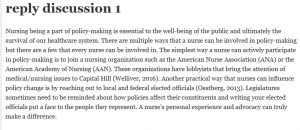reply discussion 1

Nursing being a part of policy-making is essential to the well-being of the public and ultimately the survival of our healthcare system. There are multiple ways that a nurse can be involved in policy-making but there are a few that every nurse can be involved in. The simplest way a nurse can actively participate in policy-making is to join a nursing organization such as the American Nurse Association (ANA) or the American Academy of Nursing (AAN). These organizations have lobbyists that bring the attention of medical/nursing issues to Capital Hill (Welliver, 2016). Another practical way that nurses can influence policy change is by reaching out to local and federal elected officials (Oestberg, 2013). Legislatures sometimes need to be reminded about how policies affect their constituents and writing your elected officials put a face to the people they represent. A nurse’s personal experience and advocacy can truly make a difference.
Some challenges occur when nurses take the opportunity to become involved in policy change. If you are driven to join a national nurses organization such as the ANA in the hopes of having your particular voice heard, you may feel let down. There are approximately 18,000 members of the ANA (Leadership and Governance, 2017). In such a large group you may feel overshadowed. If a nurse would like a stronger advocacy position, the ANA deploys many leadership councils, and committees, and also has a board of directors which you can apply to become a member of. Joining one of these subgroups within the organization will give you more of an opportunity to be heard.
Writing letters to local/federal officials can also feel hopeless. You may think, what will one letter do? As Margaret Mead said, “Never doubt that a small group of thoughtful committed individuals can change the world. In fact, it’s the only thing that ever has.” Your personal experiences do matter and nurses should never doubt the effect that their advocacy can have. That being said, the more people you have bringing attention to the same policy, the more attention that policy will get. Nurses with like-minded goals must band together to fight for change.
Two strategies that would help communicate the existence of these opportunities are being involved in your workplace committees and involvement with nursing education. Hospitals have many different opportunities to get involved. There are committees for departments, hospital wide committees, and sometimes even regional committees. These are great opportunities to spread knowledge about what nurses can do to advocate for policy change. For example, during COVID, our ED committee wrote a letter to Ohio Governor DeWine about the conditions that were being experienced in rural EDs. Another important opportunity is to be involved in nursing education. This can mean precepting, doing clinicals, teaching, and sometimes just sharing your advocacy knowledge with new nurses. Many times in ADN programs, political advocacy is not taught so ADN nurses usually have not thought about their unique position in political advocacy. Sharing your knowledge about political advocacy during precepting and orientation can be very impactful. In BSN programs these topics are generally introduced and then expanded on in MSN programs. With increased education, nurses can feel more confident and knowledgeable about advocacy and are more likely to use their position to create change.